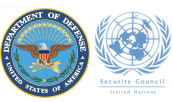 30 July 2015: The UN Security Council, under the presidency of New Zealand, held an open debate on the subject of ‘Maintenance of international peace and security: peace and security challenges facing small island developing States (SIDS).’ In related news, the US Department of Defense (DoD) released a report, titled ‘National Security Implications of Climate-Related Risks and a Changing Climate.’
30 July 2015: The UN Security Council, under the presidency of New Zealand, held an open debate on the subject of ‘Maintenance of international peace and security: peace and security challenges facing small island developing States (SIDS).’ In related news, the US Department of Defense (DoD) released a report, titled ‘National Security Implications of Climate-Related Risks and a Changing Climate.’
The UN Security Council open debate was facilitated by a concept note prepared by New Zealand, which addresses peace and security challenges faced by SIDS, including: transnational crime and piracy; illicit exploitation of natural resources, including illegal, unreported and unregulated (IUU) fishing; climate change and natural disasters; and development. It also discusses the impacts of climate change on international peace and security, and the role of the Security Council.
UN Secretary-General Ban Ki-moon recalled the guiding role of the SAMOA Pathway, the outcome document of the Third International Conference on SIDS held in Apia, Samoa, from 1-4 September 2014. He stated that “combating climate change, promoting sustainable development and addressing the vulnerabilities of SIDS will demand partnership, capacity and leadership.” Among key priorities, he identified: supporting SIDS in achieving the Millennium Development Goals (MDGs); a post-2015 development agenda and Sustainable Development Goals (SDGs) that address the needs of SIDS; and a meaningful and universal global climate agreement in Paris in December 2015.
The report on security implications of climate change issued by the US DoD responds to a US Congressional request to the Department to, inter alia, identify the most serious and likely climate-related security risks for each Combatant Command. The report finds that climate change is a security risk because it degrades living conditions, human security and the ability of governments to meet the basic needs of their populations. It also finds that communities and States that are already fragile and have limited resources are significantly more vulnerable to disruption and far less likely to respond effectively and be resilient to new challenges. [UN Press Release] [Concept Note by New Zealand] [US DoD Press Release] [Publication: National Security Implications of Climate-Related Risks and a Changing Climate]